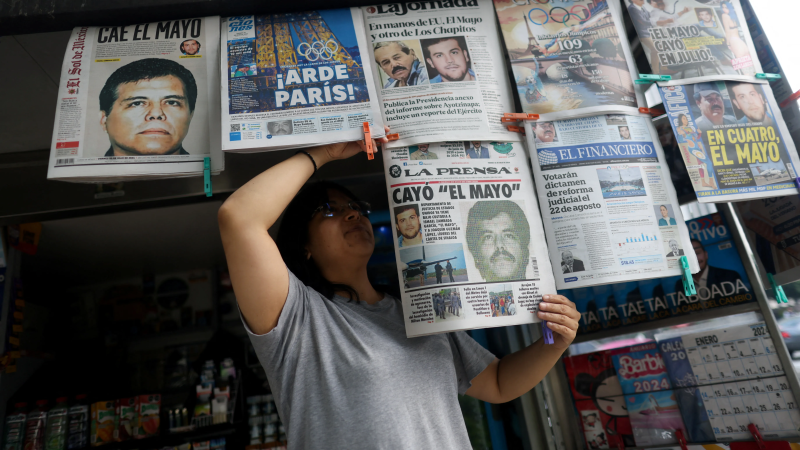Suspected Balkan drug smuggler 'Pirate of the Unknown' extradited to US
NEW YORK − A suspected Balkan drug lord dubbed the “Pirate of the Unknown” for smuggling tons of cocaine in speed boats and cargo ships on international waters was extradited from the high seas to New York to face narcotrafficking charges, according to federal prosecutors.
Milos Radonjic, 34, is accused of spearheading an operation to bring over 5,500 pounds of cocaine from South America to Europe aboard a vessel falling under U.S. legal jurisdiction. He was involved down to the last detail of secretly getting drugs on board off the coast of Colombia and Ecuador, according to federal court documents.
Radonjic, a citizen of Montenegro, is charged in the Eastern District of New York with conspiracy to violate and attempting to violate the Maritime Drug Law Enforcement Act, a law that seldom nets such high-profile cases, according to experts and a USA TODAY review of Department of Justice announcements. If convicted, Radonjic faces up to life in prison.
A federal indictment lists "Pirate of the Unknown" as his alias.
“This arrest and successful extradition is a lesson that the high seas are not a no-man’s land for the rule of law,” said Breon Peace, U.S. Attorney for the New York district, in announcing the extradition. “Working together with our law enforcement partners and allies around the world, this Office will continue to pursue narcotraffickers who seek to corrupt the critical infrastructure of global shipping to transport their poisonous cargo to our communities.”
Radonjic’s alleged attempts to smuggle drugs date back to August through December of 2020, according to court filings.
He was arrested in Italy in October 2023 after entering the country to compete in an international yacht-racing competition in which he captained a vessel, according to the U.S. Attorney’s Office.
The U.S. requested his extradition last November and the Italian Ministry of Justice granted the request last week, according to court filings.
Magistrate Judge Cheryl Pollak ordered Radonjic to be held until he can be tried, according to New York U.S. Attorney’s Office spokesperson John Marzulli. Radonjic pleaded not guilty in federal court on Monday.
Michael Weil, Radonjic’s attorney, declined to comment.
The Pirate's plan
Radonjic was a “significant narcotrafficker” for Balkan drug cartels, according to court filings, and his skills relied heavily on his years of experience working aboard cargo ships.
The so-called Pirate of the Unknown’s expertise comes across in communications intercepted by federal authorities that gave detailed instructions on how drug smugglers could get the cocaine on board without detection in the dead of night, court documents show.
He sent photos and gave instructions to his conspirators showing how speed boats laden with drugs could avoid detection by radar systems and how exactly to properly secure packages to a ship’s crane. Once on board, the crews Radonjic worked with planned to hide drugs among cargo.
Radonjic's role also involved sending out hourly updates to conspirators detailing cargo ship’s crew, route, manifest and exact GPS location, court documents say.
The Balkan cartels have become among the most powerful drug pushers in Europe in recent years.
Reporting by Reuters in May found Balkan cartels relied on the worldwide diaspora from the southeastern European nations to become key players in the maritime movement of drugs, which accounts for 90% of how drugs are shipped worldwide.
Almost all the narcotics being moved to Europe passed through the hands of the Balkan players at some point. Data cited by Reuters from the Maritime Analysis and Operations Centre, a European agency that coordinates narcotics busts, shows the Balkan cartels were linked to over 9,000 kilograms of cocaine seized on the high seas in 2023.
Rare big tuna for feds
The "Pirate of the Unknown" is among the rare big tunas the maritime law manages to bring in, according to experts.
The law was passed in 1986 at the height of the War on Drugs. It gave U.S. authorities broad powers to crackdown on the drug trade and aimed to take down kingpins coordinating major shipments of narcotics. But in practice, it’s often middlemen and those lower down that authorities catch, according to Lauren Robertson, an attorney and expert in the maritime law.
“It’s not surprising to me that it’s not often cited in major press releases,” said Robertson, who authored a research paper on the impact of the law in 2021. The people the law is used against are “more often than not” fishermen from outside the U.S. “aiming to make extra money for their families.”

Other recent cases cited by the Department of Justice are:
- The U.S. Attorney’s Office for the District of Puerto Rico indicted four Colombian men in April for allegedly smuggling 2,300 kilograms of cocaine aboard a semi-submersible vessel near the coast of Trinidad and Tobago, according to federal officials.
- Three Colombian men were charged in the Southern District of Texas in 2019 after the U.S. Coast Guard caught the small crew allegedly attempting to ferry 1,320 kilograms of cocaine aboard a vessel off the coast of Colombia, Justice officials said.
Disclaimer: The copyright of this article belongs to the original author. Reposting this article is solely for the purpose of information dissemination and does not constitute any investment advice. If there is any infringement, please contact us immediately. We will make corrections or deletions as necessary. Thank you.







